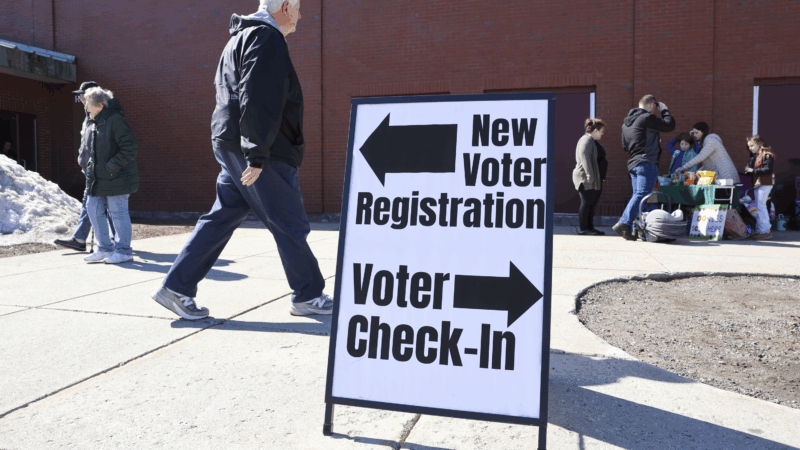Judge pauses parts of Trump’s sweeping executive order on voting
A federal judge in Washington, D.C., has paused a key section of President Trump’s executive order that makes sweeping changes to voting and elections.
Critics of Trump’s March 25 executive order say it could disenfranchise millions of would-be voters, and exceeds presidential authority.
The executive order instructs the independent Election Assistance Commission (EAC) to change the national mail voter registration form to require that applicants show a document proving U.S. citizenship before they can be registered to vote.
But a court order issued Thursday puts that instruction on hold.
“Our Constitution entrusts Congress and the States—not the President—with the authority to regulate federal elections,” wrote Judge Colleen Kollar-Kotelly in a 120-page opinion, while noting that Congress is currently debating legislation — the SAVE Act — that would require showing proof of citizenship to register to vote in federal elections.
Earlier this month, the GOP-led U.S. House of Representatives, mostly along party lines, passed the SAVE Act. The bill faces an uphill battle in the Senate, where Democrats have vowed to block it through a filibuster.
Trump’s executive order essentially seeks to implement much of the SAVE Act by executive decree – which the judge rejected.
“[N]o statutory delegation of authority to the Executive Branch permits the President to short-circuit Congress’s deliberative process by executive order,” wrote Kollar-Kotelly, who was appointed to the federal district court in Washington, D.C., by former President Bill Clinton.
The decision also pauses a second provision of Trump’s executive order that requires government agencies that give out voter registration forms to assess citizenship before giving forms to enrollees of public assistance programs.
Kollar-Kotelly’s order is a legal victory for voter registration groups and Democrats that are challenging Trump’s far-reaching executive order in three lawsuits that have been consolidated.
Other portions of the executive order are still being litigated, including a provision that withholds federal funds from states that count mail and absentee ballots that are postmarked by Election Day but are received by election officials afterwards.
Though Democratic plaintiffs had asked to pause that and other sections of the executive order, Kollar-Kotelly said those requests were premature or should be brought by states.
Another legal challenge to Trump’s order brought by 19 Democratic state attorneys general in federal court in Massachusetts is proceeding separately, though the government has asked for that case to be moved to Washington to be consolidated with the one before Kollar-Kotelly.
The plaintiffs in the consolidated lawsuit argue that the president cannot direct the Electoral Assistance Commission, a bipartisan, independent entity, what to do. The commission, which has four members, can only have two members from the same political party and cannot take action without approval from three members to ensure a bipartisan approach.
Following Trump’s executive order, the commission’s executive director sent an April 11 letter to state election officials soliciting feedback about “how states would propose to implement” the provision in question, “if required.” The EAC was set to discuss the order at its meeting Thursday.
Trump’s order says it’s needed to enforce election protections, and the government argued in court that plaintiffs did not have standing to challenge the order.
The various plaintiffs challenging Trump’s executive order argue requiring documentary proof of citizenship to register to vote would create barriers for millions of eligible voters. Trump’s executive order lists only a limited number of documents that can be used to prove citizenship, and it remains unclear if a birth certificate would be accepted. Passports are the most common option named in the executive order, but only about half of American citizens have one.
The current version of the national voter registration form was created by a 1993 federal law passed by Congress. It asks applicants to attest, under penalty of perjury, that they are U.S. citizens and eligible to vote. Noncitizens who attempt to vote illegally face deportation and jail time.
While noncitizens do sometimes wind up on voter rolls, state audits have found instances of noncitizens voting to be exceedingly rare.
Trump, however, pushed a baseless narrative during the 2024 election that large numbers of noncitizens were poised to vote and swing the election for Democrats. No evidence of such a plot has surfaced, but Trump and Republicans have continued to cite the narrative to justify more restrictive voting requirements.
US military used laser to take down Border Protection drone, lawmakers say
The U.S. military used a laser to shoot down a Customs and Border Protection drone, members of Congress said Thursday, and the Federal Aviation Administration responded by closing more airspace near El Paso, Texas.
Deadline looms as Anthropic rejects Pentagon demands it remove AI safeguards
The Defense Department has been feuding with Anthropic over military uses of its artificial intelligence tools. At stake are hundreds of millions of dollars in contracts and access to some of the most advanced AI on the planet.
Pakistan’s defense minister says that there is now ‘open war’ with Afghanistan after latest strikes
Pakistan's defense minister said that his country ran out of "patience" and considers that there is now an "open war" with Afghanistan, after both countries launched strikes following an Afghan cross-border attack.
Hillary Clinton calls House Oversight questioning ‘repetitive’ in 6 hour deposition
In more than seven hours behind closed doors, former Secretary of State Hillary Clinton answered questions from the House Oversight Committee as it investigates Jeffrey Epstein.
Chicagoans pay respects to Jesse Jackson as cross-country memorial services begin
Memorial services for the Rev. Jesse Jackson Sr. to honor his long civil rights legacy begin in Chicago. Events will also take place in Washington, D.C., and South Carolina, where he was born and began his activism.
In reversal, Warner Bros. jilts Netflix for Paramount
Warner Bros. says Paramount's sweetened bid to buy the whole company is "superior" to an $83 billion deal it struck with Netflix for just its streaming services, studios, and intellectual property.







